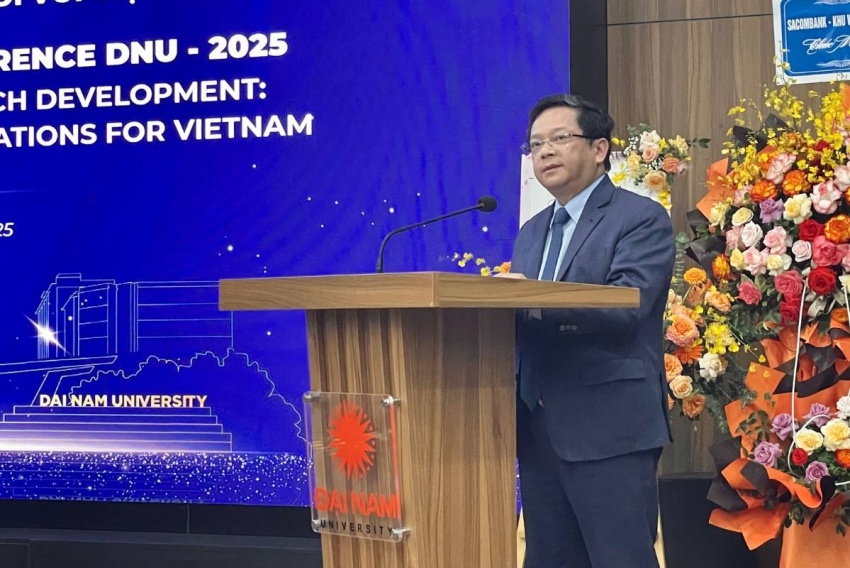INTERNATIONAL INVESTMENT
AND PORTAL
 Nguyen Duc Hien, deputy head of the Central Committee for Policy and Strategy
Nguyen Duc Hien, deputy head of the Central Committee for Policy and Strategy
At the International Scientific Conference 2025 themed “Regulatory Framework for Fintech Development: International Experience and Implications for Vietnam” held at Dai Nam University in Hanoi on August 20, experts shared insights on how fintech has become an emerging field, creating opportunities but also posing significant challenges for many countries.
Nguyen Duc Hien, deputy head of the Central Committee for Policy and Strategy, noted that fintech has been developed well, even after the Covid-19 pandemic. According to the World Economic Forum 2025, fintech maintains a growth rate of 37 per cent during 2022–2023, with impressive revenues reaching around 40 per cent.
Currently, fintech is undergoing some changes in the new context. In Vietnam, several guidelines and policies have been provided, including the early promulgation of regulations for fintech products and services.
"This was a good opportunity to learn international lessons in expanding the application of fintech. Experimental mechanisms involving blockchain, encryption, and asset management need clear boundaries while ensuring safety," Hien emphasised, stressing the importance of defining approaches to fintech based either on product categories or user needs, with a focus on risk prevention mechanisms.
Lindy Tsai, Taiwan's expert on cryptocurrency investigations, delivered a presentation titled “Fraud detection and crypto asset management: Taiwan's AI and regulatory framework”. Since 2020, Taiwan has recorded over 90,000 fraud cases annually, with projected daily losses of up to TWD400 million ($13.07 million) this year. Cryptocurrency investment fraud has emerged as a high-risk method, especially the use of USDT for fund transfers.
She introduced the 165 Anti-Fraud Platform, established by Taiwan's National Police Agency, which offers various anti-fraud functions and real-time information.
"Anyone can access this service by registering online with basic personal information. The platform helps people reduce the risk of becoming victims and provides fast support through online reporting," Tsai explained.
Luong Thi Thu Hang from the Institute of Banking and Finance under the National Economics University identified five major barriers to sustainable fintech development, such as limitations in the legal framework. Vietnam still lacks a unified regulatory framework for fintech. Relevant provisions are scattered across multiple laws, such as cybersecurity and data security risks, and limitations in the legal framework.
“The Law on Credit Institutions and the Law on Electronic Transactions, leading to overlaps, legal loopholes, and risks for both businesses and regulators,” she emphasised.
Some burdens come from the lack of investment capital that fintech startups are struggling with raising sufficient funds and resources to sustain operations. A shortage of capital prevents fintech companies from upgrading technology, developing new products, or maintaining existing service quality, thereby reducing user experience.
The last one is the digital divide and unequal access to financial technologies. In rural areas, although internet usage is increasing, network quality remains weak.
In recent years, a series of regulations related to fintech have been issued, affirming Vietnam's strong commitment to this sector. Resolution No. 57-NQ/TW, issued by the Politburo last December, clearly identifies the task of building and utilising shared digital platforms at national and regional levels, ensuring connectivity and consistency across sectors in the digital environment, thereby promoting the digital economy ecosystem.
On June 27, 2025, the National Assembly passed Resolution No. 222/2025/QH15 on establishing international financial centres in Ho Chi Minh City and Danang, with special mechanisms, including controlled experimental frameworks (sandbox) for fintech and innovation.
Directive No. 01/CT-TTg (March 1, 2025) assigned the Ministry of Finance and the State Bank of Vietnam to urgently finalise the legal framework for digital assets and the sandbox, and to establish a regulated cryptocurrency exchange, aiming to protect investors and support businesses in raising capital.
 GM Vietnam 2025 kicks off new digital asset era
GM Vietnam 2025 kicks off new digital asset era
The launch of GM Vietnam 2025 marks a major step in Vietnam's rise as a regional digital asset hub, amid the rollout of the National Blockchain Strategy, Digital Technology Industry Law, and a growing influx of international capital.
 Vietnam's legislative breakthrough on digital assets
Vietnam's legislative breakthrough on digital assets
With legal clarity on digital assets now in place, Vietnam is poised to draw in global capital. Tran Huyen Dinh, chairman of the Fintech Application Committee under the Vietnam Blockchain Association (VBA) discussed with VIR's Hoang Oanh how the new law could reshape fintech, blockchain, and investor confidence.
 P2P lending under regulatory sandbox mechanism: notes for legal entity lenders
P2P lending under regulatory sandbox mechanism: notes for legal entity lenders
Decree No. 94/2025/ND-CP on the regulatory sandbox mechanism in the banking sector officially took effect from July 1. Among the fintech solutions approved for sandbox testing under this decree, the peer-to-peer (P2P) lending solution has attracted significant attention.



















